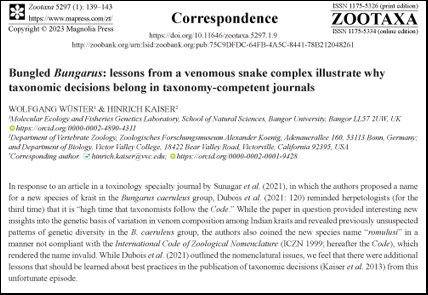References
- Abreu, J.M., Salvi, D., Perera, A. & Harris, D.J. (2020) Mitochondrial lineages or discrete species? Assessing diversity within Timon tangitanus (Lacertidae) using mitochondrial and nuclear DNA sequences. Amphibia-Reptilia, 41, 123–132. https://doi.org/10.1163/15685381-20191186
- Beall, J. (2017) What I learned from predatory publishers. Biochemia Medica, 27, 273–278. https://doi.org/10.11613/BM.2017.029
- Burbrink, F.T. (2001) Systematics of the eastern ratsnake complex (Elaphe obsoleta). Herpetological Monographs, 15, 1–53. https://doi.org/10.2307/1467037
- Burbrink, F.T., Gehara, M., McKelvy, A.D. & Myers, E.A. (2021) Resolving spatial complexities of hybridization in the context of the gray zone of speciation in North American ratsnakes (Pantherophis obsoletus complex). Evolution, 75, 260–277. https://doi.org/10.1111/evo.14141
- Chen, Z.-N., Shi, S.-C., Vogel, G., Ding, L. & Shi, J.-S. (2021) multiple lines of evidence reveal a new species of krait (Squamata, Elapidae, Bungarus) from southwestern China and northern Myanmar. ZooKeys, 1025, 35–71. https://doi.org/10.3897/zookeys.1025.62305
- Dubois, A., Frétey, T. & Ineich, I. (2021) It is high time that taxonomists follow the Code. 3. The Bungarus romulusi case (Serpentes, Elapidae). Bionomina, 21, 120–122. https://doi.org/10.11646/bionomina.21.1.8
- Dubois, A., Frétey, T. & Ohler, A. (2018) The Relictus case: it is high time that taxonomists follow the Code’s requirements for nomenclatural availability and validity of new zoological nomina. Bionomina, 13, 51–64. https://doi.org/10.11646/bionomina.13.1.4
- Hames, I. (2007) Peer Review and Manuscript Management in Scientific Journals. Blackwell Publishing, Malden, Massachusetts, 320 pp. https://doi.org/10.1002/9780470750803
- Hillis, D.M. (2019) Species delimitation in herpetology. Journal of Herpetology, 53, 3–12. https://doi.org/10.1670/18-123
- Hillis, D.M., Chambers, E.A. & Devitt, T.J. (2021) Contemporary methods and evidence for species delimitation. Ichthyology & Herpetology, 109, 895–903. https://doi.org/10.1643/h2021082
- Holding, M.L., Sovic, M.G., Colston, T.J. & Gibbs, H.L. (2021) The scales of coevolution: comparative phylogeography and genetic demography of a locally adapted venomous predator and its prey. Biological Journal of the Linnean Society, 132, 297–317. https://doi.org/10.1093/biolinnean/blaa192
- ICZN [International Commission on Zoological Nomenclature] (1999) International Code of Zoological Nomenclature. 4th Edition. The International Trust for Zoological Nomenclature, London, 306 pp. https://doi.org/10.5962/bhl.title.50608
- Kaiser, H., Crother, B.I., Kelly, C.M.R., Luiselli, L., O’Shea, M., Ota, H., Passos, P., Schleip, W.D. & Wüster, W. (2013) Best practices: in the 21st Century, taxonomic decisions in herpetology are acceptable only when supported by a body of evidence and published via peer-review. Herpetological Review, 44, 8–23.
- Oviedo-García, M.Á. (2021) Journal citation reports and the definition of a predatory journal: the case of the Multidisciplinary Digital Publishing Institute (MDPI). Research Evaluation, 30, 405–419. https://doi.org/10.1093/reseval/rvab020
- Padial, J.M., Miralles, A., de la Riva, I. & Vences, M. (2010) The integrative future of taxonomy. Frontiers in Zoology, 7, 16. https://doi.org/10.1186/1742-9994-7-16
- Sunagar, K., Khochare, S., Senji Laxme, R.R., Attarde, S., Dam, P., Suranse, V., Khaire, A., Martin, G. & Captain, A. (2021) A wolf in another wolf’s clothing: post-genomic regulation dictates venom profiles of medically-important cryptic kraits in India. Toxins, 13, 69. https://doi.org/10.3390/toxins13010069
- Wallach, V., Williams, K.L. & Boundy, J. (2014) Snakes of the World; CRC Press, Boca Raton, Florida, 1237 pp. https://doi.org/10.1201/b16901


